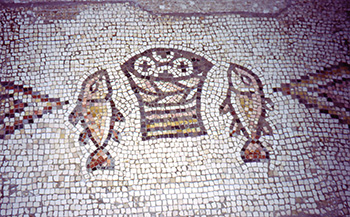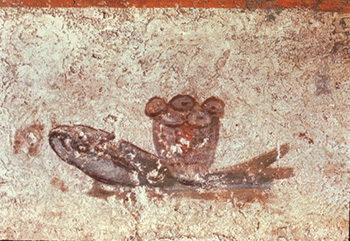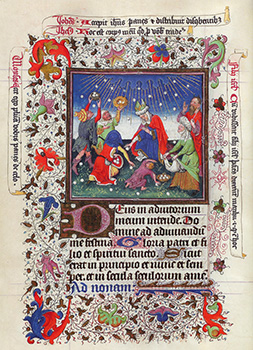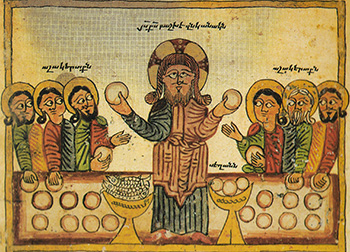From Our Archives
Michael Fitzpatrick, Sun and Shield (2021); Debie Thomas, Choose This Day (2018); and Dan Clendenin, A "Profound Mystery."
This Week's Essay
John 6:66, "Many of his disciples turned back and no longer followed Jesus."
For Sunday August 25, 2024
Lectionary Readings (Revised Common Lectionary, Year B)
Psalm 84 or Psalm 34:15–22
Ephesians 6:10–20
John 6:56–69
For five weeks in a row now, the lectionary hasn't budged from the lengthy Bread of Life discourse in John 6. After feeding the five thousand with literal bread, Jesus urged the crowd to seek spiritual bread. He called it true food, bread from heaven, bread of life, the bread of God, living bread, real food, and, in Psalm 78 a few weeks ago, the bread of angels. In a mysterious paradox that has flummoxed people ever since, Jesus said that we discover this spiritual bread in his physical body.
Just as he compared himself to "living water" that quenches our parched souls (John 4), Jesus called himself the "living bread" that satisfies our deepest hungers. The ancient Hebrews ate miraculous manna from heaven in the desert (Exodus 16), says Jesus, but they nevertheless died. The five thousand who were fed, with an abundance of leftovers, were nonetheless hungry the next morning. In a stark contrast, Jesus says that he is "the living bread that came down from heaven. If a man eats of this bread, he will live forever. This bread is my flesh, which I will give for the life of the world."
All this sounds great, but some of the crowd wasn't having it. People started leaving Jesus.
If the Bread of Life discourse sounds crazy today, we can console ourselves that it scandalized the original audience. "Does this offend you?" asked Jesus. Some of the crowd "argued sharply among themselves" about Jesus comparing himself to God; wasn't he just the son of Joseph, "whose father and mother we know? How can he say such things?" Conscientious Jews took offense at the repulsive idea of "eating flesh and drinking blood," which were strictly prohibited. Even his own disciples objected: "This is a hard saying, who can accept it?"
 |
|
Tabgha mosaic in Galilee, 5th century.
|
And so the long and lofty Bread of Life discourse of the last five weeks ends in conflict and controversy: "From this time on many of his disciples turned back and no longer followed Jesus."
The apostle Paul coined a term for this. He called it "shipwreck of faith."
Many people left Jesus for many different reasons. Judas betrayed him for money. Peter denied even knowing Jesus, then lied about his denial. At the crucifixion all of his closest disciples fled in fear. When some Athenians in the Areopagus heard Paul proclaim the resurrection, "they sneered" at the "strange demons" he advocated, and ridiculed him as a "rag picker." John Mark deserted Paul on their first missionary journey.
In 1–2 Timothy, Paul says that Hymenaeus and Alexander "blasphemed" the faith. Phygelus and Hermogenes "turned away" from him. Alexander the coppersmith "did him great harm." Philetus "wandered away" from the gospel. Demas "loved the world" and deserted Paul. There are many, Paul laments, who "fall away from the truth." At his trial, he says that "everyone deserted me."
Those of us who are submerged in our Christian sub-cultures — Bible studies, weekly liturgy, denominational meetings, mission projects, youth groups, summer camps, Christian schools and colleges — might raise our eyebrows about church dropouts, but that attitude risks self-righteous sanctimony. In our enthusiasm to commend the gospel, we can soften its hard edges, domesticate its subversive message, minimize its mystery, and dismiss uncomfortable questions. In his book What Jesus Meant, Garry Wills writes that Jesus is always "more outrageous, [and] more egregious" than we ever expect. Even if scholars found the "true and original" Jesus "behind" the Bible texts, says Wills, he would appear more rather than less incomprehensible to us.
 |
|
Eucharistic bread and fish, Catacomb of Callistus (Rome), 3rd century.
|
Some time during my high school years my father stopped attending church. He never explained why, and I never asked. To make matters worse, since my mother never learned to drive, every Sunday he still dropped us off and picked us up at our small-town Presbyterian church. I still remember how awkward that felt as a teenager, Dad waiting at the curb for us in his car, seeing and being seen by our neighbors with whom he used to worship.
The "hard sayings" of the enigmatic Jesus are only one reason why some people quit the faith. I suspect that my father lost faith in the church as an institution. Others leave because of boredom, legalistic pettiness, partisan politics of both the left and right, superficial platitudes, unanswered prayers, bitter disappointments, intellectual doubts, nagging questions, or life traumas that "crush the spirit" (Psalm 34:18). In her memoir Leaving Church (2006), Barbara Brown Taylor seems to have left church precisely in order to save her faith.
One of the most powerful portraits of a near shipwreck of faith is the book The Diary of a Country Priest (1936) by George Bernanos. The novel won the Grand Prix du Roman, one of the oldest and most prestigious literary awards in France, and was made into an award-winning movie in 1951.
Bernanos tells the story of a young, unnamed priest who struggles with his sense of vocation. Despite his earnest efforts, and the encouragement of a trusted colleague, he feels like a failure. From a human perspective, he's not mistaken.
 |
|
Exodus 16 manna from heaven, Book of Hours, c. 1440.
|
His small, rural parish is bored, boring, and petty. They gossip about him as a "secret drinker" and a womanizer, both of which are ludicrous accusations. He gets hate mail. His catechism class and sports club both falter. He gets embroiled in the bitter struggles of a wealthy family. He clashes with clergy bureaucrats over how to do his job.
Nonetheless, the priest perseveres. He loves his people. He visits every home every year. He prays for them.
His personal life is just as bad. He broods about the shame and pain of his peasant upbringing. He suffers from a chronic illness, an impoverished diet, and no money. He's self-conscious about his "superhuman clumsiness" and his social awkwardness. He has an "insuperable disgust" with his "absurd self."
There are also theological questions. He's powerless in the presence of suffering, and ponders the mystery of prayer. He's lonely and isolated. He sometimes feels like he's play-acting and merely parroting pious cliches.
Reflecting upon his "wretched weakness," he confides to his diary: "Oh, yes, I've worked hard enough! I've done my best, and what's the use? My best is nothing."
He compares himself to "a hornet in a bottle," and so he keeps his diary — to keep himself honest, unburden himself to God, and record "the simple trivial secrets of a very ordinary kind of life."
His diary reflects his sense of futility about his call to ministry. "We pay a heavy, very heavy price for the super-human dignity of our calling. The ridiculous is always so near to the sublime. And the world, usually so indulgent to foibles, hates ours instinctively." And so he frets: "Am I where our Lord would have me? Twenty times a day I ask this question."
Faced with this looming shipwreck of faith, an older colleague affirms the young priest. He encourages him with wise advice: "Keep saying your lessons. Go on with your work. Keep at the little daily things that need doing, til the rest comes. Concentrate. Think of a lad at his homework, trying so hard and his tongue sticking out. That's how our Lord would have us be when he gives us up to our own strength. Little things — they don't look like much, yet they bring peace. Like wild flowers which seem to have no scent, till you get a field full of 'em."
"Keep marching to the end," he tells the discouraged priest, "and try to end up quietly at the roadside without shedding your equipment."
 |
|
Feeding the multitude. Armenian manuscript. Daniel of Uranc gospel, 1433.
|
And that's what the young priest does. In one turn of events, he's shocked to see how God clearly used him in the life of a parishioner. "Oh, miracle, thus to be able to give what we ourselves do not possess, sweet miracle of our empty hands."
By the time he dies of stomach cancer at a young age, Bernanos has painted a portrait of a genuine saint. "Well, it's all over now. The strange mistrust I had of myself, of my own being, has flown. I believe forever. That conflict is done. I cannot understand it anymore. I am reconciled to myself, to the poor, poor shell of me. How easy it is to hate oneself! True grace is to forget. Yet if pride could die in us, the supreme grace would be to love oneself in all simplicity."
The young priest does not shipwreck his faith. He ends up right where the Bread of Life discourse does in John 6:68–69. When Jesus turned away from the doubting crowds, and the many disciples who stopped following him, he asked "The Twelve" a question: "Do you want to leave too?" To which Peter responded, "Lord, to whom shall we go? You have the words of eternal life. We believe and know that you are the Holy One of God."
Weekly Prayer
Edwina Gateley
Silent God
From Edwina Gateley, There Was No Path So I Trod One (1996, 2013)This is my prayer—
That, though I may not see,
I be aware
Of the Silent God
Who stands by me.
That, though I may not feel,
I be aware
Of the Mighty Love
Which doggedly follows me.
That, though I may not respond,
I be aware
That God—my Silent, Mighty God,
Waits each day.
Quietly, hopefully, persistently.
Waits each day and through each night
For me.
For me—alone.
Dan Clendenin: dan@journeywithjesus.net
Image credits: (1) Wikimedia.org; (2) Wikimedia.org; (3) Wikimedia.org; and (4) Wikipedia.org.





